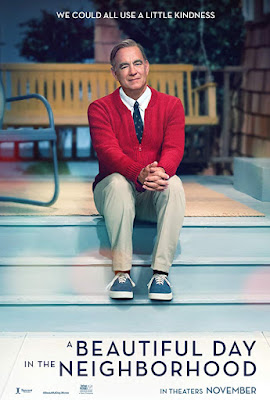A Beautiful Day in the Neighborhood (2019 Film) Review
 Won't you be Tom Hanks' neighbor as he portrays one of the world's kindest people?
Won't you be Tom Hanks' neighbor as he portrays one of the world's kindest people?Based on a true story, investigative journalist Lloyd Vogel is assigned to profile Fred Rogers. At first, Vogel is skeptical about Rogers, believing that no one could have such a good nature. As he gets to know him, though, Rogers' kindness chips away at Vogel's pessimistic outlook on life, which forces Vogel to reconcile his own painful past.
Tom Hanks is Fred Rogers, while Matthew Rhys plays Lloyd Vogel. Susan Kelechi Watson stars as Andrea Vogel, Lloyd's wife. Chris Copper plays Jerry Vogel, Lloyd's father, and Maryann Plunkett plays Joanne Rogers, Fred's wife. Finally, Enrico Colantoni plays Bill Isler, the President & CEO of Family Communications.
Marielle Heller directed "A Beautiful Day in the Neighborhood." Micah Fitzerman-Blue and Noah Harpster wrote the script, inspired by Tom Junod's 1998 Esquire article, titled "Can You Say... Hero?" Youree Henley, Peter Saraf, Marc Turtletaub, and Leah Holzer produced the film. Sony Pictures Releasing distributed "A Beautiful Day in the Neighborhood."
Overall Thoughts
I knew of Fred Rogers and his long-running television program, but I did not understand their significance until after I watched Marielle Heller's beautiful picture. "A Beautiful Day in the Neighborhood" is both an inspirational drama and a testament to the power of Fred Rogers and his many teachings. As proven by this film, even after his death, there's still more to learn from Mister Rogers.
Though Tom Hanks' portrayal of Rogers is all over the marketing and awards news, it's Matthew Rhys who delivers the film's best and most crucial performance. His Lloyd Vogel, a character loosely based on the real-life reporter Tom Junod, is the viewer's point-of-view character, and he's remarkable in the part. Considering his attitude toward life, Lloyd could've been a very unlikable person, yet, because of Rhys, you understand why he would think that way. The important part of this role is that Lloyd carries emotional scars that are very adult, they're not simple problems, so that's where his testing of Fred Rogers comes in. Vogel believes that Rogers' teachings only apply to children, his program's target audience. His journey to recovery is paced deliberately and full of tears, both of sadness and of joy. One could argue that I cried too much; I think my tears were warranted because it was that impactful.
Tom Hanks' casting as Mister Rogers is absolutely spot-on. Even without the news and award headlines, there's an expectation to Hanks' casting, in that Tom Hanks was Fred Rogers' favorite actor. Being the master he is, however, Hanks more-than meets the expectations surrounding him. From what little I know of Rogers, Hanks captures the soft-spoken, kind personality that Rogers possessed. With an uplifting script, his lines are moving, the kind you could quote to a friend to lift their spirits. Hanks' performance prompts so much goodness that it's no wonder why he was chosen to play Rogers. You instantly fall in love with him in the part, and that love grows as the film continues. Though not the main actor, this movie would be incomplete without Hanks' involvement, for reasons both obvious and surprising. Hanks is, as many others are saying, an absolute shoo-in for Best Supporting Actor at the Oscars this year.
The rest of the supporting actors contribute more than you might think they do. They give their roles sufficient individuality. Chris Cooper, for example, gives the role of the imperfect father much-needed finesse. He turns in a great performance, the best I've seen him give in years, despite not having a huge amount of screen time. Susan Kelechi Watson has a more prominent supporting role as Andrea, Lloyd's wife, and delivers equally stirring work. Maryann Plunkett is my favorite, outside of Hanks, as Joanne Rogers. Her scenes are simple, but they reveal a lot about her character and her relationship with Fred.
As a side note, an interesting production design choice here is that, when scenes transition from one location to another, we cut to models of these locations, but they're done in the style of those seen in "Mister Rogers' Neighborhood." On paper, it sounds like an odd choice, one that may not work in the film's favor. Surprisingly, it does work, and you're charmed by the simplicity and innocence of the execution.
Fred Rogers' show taught valuable life lessons through child-oriented means. This movie teaches similar lessons through a more mature angle, but the same values still apply. "A Beautiful Day in the Neighborhood" is not a family movie per se, but they'll certainly love this film, particularly its morals. This is the type of film anyone can enjoy. They won't have to research anything; they don't even have to know who Mister Rogers is to follow the story and characters. As someone who had entry-level knowledge of Rogers going in, I was encouraged to go home and learn more about him, watch a few episodes of his show, and even read the article real-life reporter Tom Junod wrote on him, the same article this film is based on. This film isn't designed solely for that purpose, though it is a welcome result, I'm sure. Packed with heart, "A Beautiful Day in the Neighborhood" is one film you should instantly put on your must-see list.
This has been my review of "A Beautiful Day in the Neighborhood." I hope you enjoyed it. Have you seen the film? If you have, share your thoughts in the comments below. Should you feel inclined, recommend a film for me to review next. Thank you for reading, I'm Dallin, your resident film fanatic, and I'll return soon with another review.
Tom Hanks' casting as Mister Rogers is absolutely spot-on. Even without the news and award headlines, there's an expectation to Hanks' casting, in that Tom Hanks was Fred Rogers' favorite actor. Being the master he is, however, Hanks more-than meets the expectations surrounding him. From what little I know of Rogers, Hanks captures the soft-spoken, kind personality that Rogers possessed. With an uplifting script, his lines are moving, the kind you could quote to a friend to lift their spirits. Hanks' performance prompts so much goodness that it's no wonder why he was chosen to play Rogers. You instantly fall in love with him in the part, and that love grows as the film continues. Though not the main actor, this movie would be incomplete without Hanks' involvement, for reasons both obvious and surprising. Hanks is, as many others are saying, an absolute shoo-in for Best Supporting Actor at the Oscars this year.
The rest of the supporting actors contribute more than you might think they do. They give their roles sufficient individuality. Chris Cooper, for example, gives the role of the imperfect father much-needed finesse. He turns in a great performance, the best I've seen him give in years, despite not having a huge amount of screen time. Susan Kelechi Watson has a more prominent supporting role as Andrea, Lloyd's wife, and delivers equally stirring work. Maryann Plunkett is my favorite, outside of Hanks, as Joanne Rogers. Her scenes are simple, but they reveal a lot about her character and her relationship with Fred.
As a side note, an interesting production design choice here is that, when scenes transition from one location to another, we cut to models of these locations, but they're done in the style of those seen in "Mister Rogers' Neighborhood." On paper, it sounds like an odd choice, one that may not work in the film's favor. Surprisingly, it does work, and you're charmed by the simplicity and innocence of the execution.
Fred Rogers' show taught valuable life lessons through child-oriented means. This movie teaches similar lessons through a more mature angle, but the same values still apply. "A Beautiful Day in the Neighborhood" is not a family movie per se, but they'll certainly love this film, particularly its morals. This is the type of film anyone can enjoy. They won't have to research anything; they don't even have to know who Mister Rogers is to follow the story and characters. As someone who had entry-level knowledge of Rogers going in, I was encouraged to go home and learn more about him, watch a few episodes of his show, and even read the article real-life reporter Tom Junod wrote on him, the same article this film is based on. This film isn't designed solely for that purpose, though it is a welcome result, I'm sure. Packed with heart, "A Beautiful Day in the Neighborhood" is one film you should instantly put on your must-see list.




Comments
Post a Comment